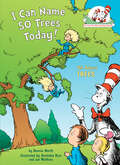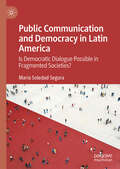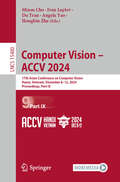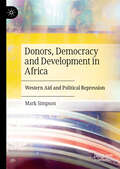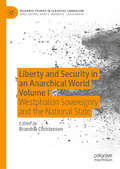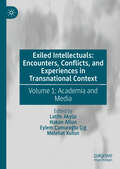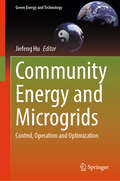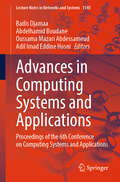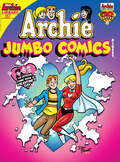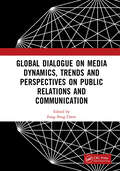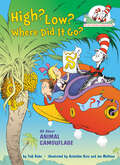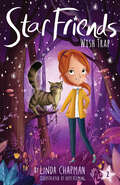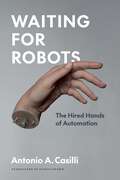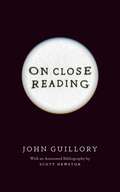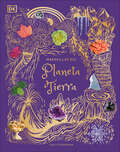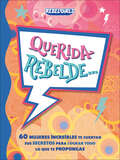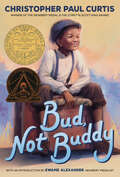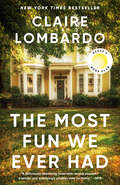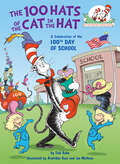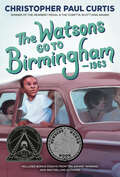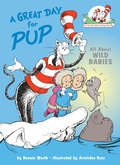- Table View
- List View
I Can Name 50 Trees Today! All About Trees: All About Trees (The Cat in the Hat's Learning Library)
by Bonnie WorthLaugh and learn with fun facts about trees like the redwood, white oak, royal palm, and more—all told in Dr. Seuss&’s beloved rhyming style and starring the Cat in the Hat! &“Knowing trees&’ names, my dear miss and dear mister, is like knowing the name of your brother or sister." The Cat in the Hat&’s Learning Library series combines beloved characters, engaging rhymes, and Seussian illustrations to introduce children to non-fiction topics from the real world! Branch out and learn about: the different parts of a treehow to identify different specieswhy a tree has barkand much more! Perfect for story time and for the youngest readers, I Can Name 50 Trees Today! All About Trees also includes an index, glossary, and suggestions for further learning. Look for more books in the Cat in the Hat&’s Learning Library series!High? Low? Where Did It Go? All About Animal CamouflageIs a Camel a Mammal? All About MammalsThe 100 Hats of the Cat in the Hat: A Celebration of the 100th Day of SchoolA Great Day for Pup: All About Wild BabiesWould You Rather Be a Pollywog? All About Pond LifeHappy Pi Day to You! All About Measuring CirclesFine Feathered Friends: All About BirdsMy, Oh My--A Butterfly! All About ButterfliesOh Say Can You Seed? All About Flowering PlantsInside Your Outside! All About the Human BodyIce is Nice! All About the North and South Poles
Public Communication and Democracy in Latin America : Is Democratic Dialogue Possible in Fragmented Societies?
by María Soledad SeguraThe book examines alternatives proposed and implemented by governments, civil society organizations, social movements and companies in Latin America to democratize public communication and overcome its current problems, such as the dissemination of alternative facts and fake news, anti-scientific discourse, harassing, discriminatory and hate speech, anti-human rights and anti-democracy discourses, and the contempt for political correctness. Drawing on theoretical approaches from media and communication, political studies and sociology, the book identifies strengths and weaknesses of the strategies for promoting democratic dialogue in Latin America and globally.
Computer Vision – ACCV 2024: 17th Asian Conference on Computer Vision, Hanoi, Vietnam, December 8–12, 2024, Proceedings, Part IX (Lecture Notes in Computer Science #15480)
by Hongbin Zha Angela Yao Minsu Cho Ivan Laptev Du TranThis 10-volume LNCS conference set constitutes the proceedings of the 17th Asian Conference on Computer Vision, in Hanoi, Vietnam, held during December 8–12, 2024. The 270 full papers together included in this volume were carefully reviewed and selected from 839 submissions. The conference presents and discusses new problems, solutions, and technologies in computer vision, machine learning, and related areas in artificial intelligence.
Palm Oil Industry: Plantation and Process Towards Circular Economy
by Abu Zahrim Yaser Noor Azrimi Umor Nahrul Hayawin ZainalThis book highlights current efforts and research on sustainable solutions for the palm oil industry, including production and waste management. It provides an overview of sustainable principles and practices within the industry and explores ongoing initiatives to utilize various oil palm waste. In addition to extraction of lignin and cellulose, the book also discusses the use of oil palm biomass for environmental remediation.
Civil Engineering, Material and Smart Buildings: Proceeding of the 5th International Conference on Advanced Technologies and Humanity (ICATH'2023) (Sustainable Civil Infrastructures)
by Brahim El Bhiri Ayman S. Mosallam Safae MerzoukAs cities continue to grow and evolve, the challenges of building sustainable, resilient, and efficient urban environments have never been greater. This comprehensive volume presents cutting-edge research and innovative solutions in the fields of construction, materials science, and civil engineering. With contributions from leading experts and researchers, this book explores the transformative role of new technologies, sustainable materials, and advanced methodologies in shaping the future of cities worldwide. Part 1: New Ideas and Innovations in City Structures showcases groundbreaking research in areas such as manganese enrichment from mining tailings, the integration of machine learning in civil engineering, and the harmonious blend of mathematics and aesthetics in urban design through Moroccan and Andalusian tiling. These innovations push the boundaries of what’s possible in urban planning and construction, offering insights into the future of city development. Part 2: Construction and Materials delves into the practical applications and challenges of using sustainable materials like Ferrock concrete, recycled asphalt pavement, and fiber-reinforced polymers (FRP) for structural reinforcement. With a focus on durability and environmental impact, this section provides a thorough review of current best practices and emerging technologies that promise to revolutionize the construction industry. Part 3: Testing and Technologies in Urban Infrastructure highlights the latest testing techniques and technologies used to evaluate and improve the safety, efficiency, and sustainability of urban buildings and infrastructure. From seismic performance in reinforced concrete structures to the development of zero-energy buildings, this section offers a detailed analysis of the cutting-edge methods that are driving innovation in modern cityscapes. This book is an essential resource for professionals, researchers, and students in civil engineering, urban planning, and materials science. By exploring both theoretical concepts and real-world applications, " Civil Engineering, Material, and Smart Buildings: New Technologies in Cities' Infrastructures" provides valuable insights into the future of urban construction and the key technologies that will shape the cities of tomorrow.
Donors, Democracy and Development in Africa: Western Aid and Political Repression
by Mark SimpsonUganda, Ethiopia and Rwanda have figured prominently in the post- Cold War relations between Western donors and Sub-Saharan Africa. Their ‘new leaders’ were embraced by Western countries as the antithesis of former Cold War-era African strongmen, and their countries became ‘donor darlings’, benefitting from regular and significant inflows of Western development assistance. To the dismay of African democracy activists and human rights defenders, such aid enabled the regimes in these countries to strengthen the repressive political and economic governance systems over which they preside. Using a multi-disciplinary approach, this book examines the role of Western development assistance in supporting these authoritarian African regimes. It connects changing Western donor policies and priorities to developments within the three African countries, to the past of these ruling parties as armed liberation movements, to wider regional and global political, economic and strategic shifts, and highlights the skillful management by Kampala, Addis Ababa and Kigali of Western aid and international aid architecture to ensure regime preservation.
Liberty and Security in an Anarchical World Volume I: Westphalian Sovereignty and the National State (Palgrave Studies in Classical Liberalism)
by Brandon ChristensenThis book takes a hard look at libertarian foreign policy doctrines, especially those of non-intervention, interstate federalism, and non-aggression, and applies new insights to these old doctrines. Classical liberal thinkers such as Vincent Ostrom, James Madison, and F.A. Hayek have all hinted at the idea of world governance from a libertarian standpoint. Yet today, “the libertarian position” on foreign policy is either non-intervention from the US side of the Atlantic or half-hearted confederation from the European side of the Atlantic. This volume (I) hones in on the problems of Westphalian sovereignty and its nationalist shortcomings, while the other celebrates Westphalian sovereignty’s achievements in regards to keeping imperialism at bay.
Exiled Intellectuals: Volume 1: Academia and Media
by Latife Akyüz Melehat Kutun Hakan Altun Eylem Çamuroğlu ÇığRight after the Gezi Resistance, a new tendency of authoritarianism rapidly emerged in Turkey and AKP government started targeting anyone it perceives as a threat to its rule, especially academics, journalists, politicians, actors, directors, i.e. the intellectuals who produce oppositional art and critical knowledge, criminalizing them as enemies of the state. The authoritarian regime has permeated every aspect of economic, social, cultural, and political life, institutionalized primarily through the ongoing state of emergency declared in the wake of the July 15, 2016 coup attempt (one might also consider this as a controlled and manipulated toxoid coup). This new climate has started to limit the opportunities of production and reproduction for the intellectuals and artists, and even holding a dissident stance became a source of risk on its own. The Republic of Turkey limited, oppressed and punished the means of expression by giving one of the harshest (and maybe the most violent) reactions of its history against critical thought and opposition. The culture of democracy, which was almost already non-existent, has been completely abolished through the suspension of democracy on the ostensible level. This ongoing period is one, in which producers of critical knowledge and opposing artists are being faced with immense oppression and penal sanctions. One of the outcomes of this process is a kind of new-nomadism that we can sketch out as “leaving behind”. And one of the forms of this leaving is (voluntary or involuntary) exile. The majority of those whom we call “new-exile intellectuals” today have relocated generally to Western Europe, Great Britain, the United States, and especially to Germany. This new wave of political forced migration, which started in the aftermath of the Gezi uprisings and gained momentum following the coup attempt, has been defined by the editors of the book as “new-exile”', in order to draw a framework, as it has some unique characteristics different from the previous waves. The fundamental property of this experience is the simultaneous mobilization of intellectual capital and (bi-polar) opposition. This oppositional stance is both against the dominant global order and against German-style authoritarianism as well as Turkish-style fascism. It is bi-polar in the context of exile. The form of the opposition in question has the ability to take root in the lands it arrives at. It does not point towards a single direction (forward or backward) and a single place (the place it was ruptured); it is here/now and multidirectional. This state of new-exile bears the efforts of existing critical knowledge and art producers in the “heim” to which they have relocated, as critical knowledge and art producers are opposed to the dominant world system as well as to fascism in Turkey. As political subjects of the resistance against authoritarianism, they are continuously and collectively fighting against the structural fate of displacement. As both subjects and researchers of this current state of new-exile, it is our primary responsibility to understand and produce knowledge of these intellectuals’ responses in this new life, to monitor the creation processes of the new mechanisms to cope with the challenges, and to understand/investigate the effects of all these on the transnational social space. We have tried to determine the content of this book based on our own experiences as new-exiled intellectuals. We believe that in this period of new-exile we are subjects and witnesses of a historic period due to our individual struggle for existence as well as our modes of organization and solidarity as a group of new-exiled intellectuals. On one hand, we know that while transforming ourselves, we pave the way for mutual interaction and the transformation of the structures in which we relate. This is precisely why the motivation behind the idea of compiling this book, lies not only in academic concerns such as analyzing t
Community Energy and Microgrids: Control, Operation and Optimization (Green Energy and Technology)
by Jiefeng HuThis book focuses on community energy and microgrids with details including system control, operation, optimization, as well as communication requirements. It provides insight into future community microgrids development for scholars/engineers in academic and industry communities with conceptual illustration, investigations, and examples in the changing energy landscape. The topics covered includes Basic understanding of community energy and microgrids; Overview of cutting-edge technologies in power converter control and distributed power generation; Energy storage systems and electric vehicles in home energy systems; Demand response and fault protection with working principles; Monitoring, communication and control of a microgrid from a practical point of view, toward operational benefit optimization. This book can promote research in renewable energy and future smart grid and motivate the generation of new technologies to address the current challenges. The target audiences include scholars, researchers, students, lab technicians, engineers, managers in both academic and industry broader communities.
Advances in Computing Systems and Applications: Proceedings of the 6th Conference on Computing Systems and Applications (Lecture Notes in Networks and Systems #1145)
by Badis Djamaa Abdelhamid Boudane Oussama Mazari Abdessameud Adil Imad Eddine HosniThis book is a comprehensive and up-to-date guide to the recent trends and advances in the rapidly evolving field of computing systems and applications. It compiles selected articles from the 6th conference on computing systems and applications and presents the latest research findings, original ideas, and practical applications, showcasing the state-of-the-art in the field. The book is designed for researchers, practitioners, and students seeking to understand cutting-edge developments and trends in computer science. It also serves as a valuable resource for exploring the potential and impact of computing systems and applications across various domains and disciplines.
Archie Double Digest #357 (Archie Double Digest #357)
by Archie SuperstarsBRAND NEW STORY: “Now That STINGS!” There’s an indoor flower show taking place in a huge greenhouse in Riverdale. But things are about to get buzzing when a madman known as the Murder Hornet crashes the event! It’s up to Pureheart and The Fly to save the day!
Global Dialogue on Media Dynamics, Trends and Perspectives on Public Relations and Communication: Proceedings of the International Conference on Public Relations and Media Communication, (PRMC 2024), June 28-30, 2024, Beijing, China
by Fong Peng ChewThis book contains the proceedings of the International Conference on Public Relations and Media Communication (PRMC 2024) which explore the dynamic intersections of public relations and media in today’s rapidly evolving landscape. It has a repository of innovative research, insightful discussions, and emerging trends in digital media strategies, crisis communication, media ethics, public relations in the age of social media, and the impact of emerging technologies on media practices. It touches upon a wide array of topics and provides a comprehensive overview of the latest advancements and challenges in these fields. With innovative research contributions and case studies from around the world, this book will be instructive in shaping the way we look at the world of media and ourselves. This is a highly useful guide for university professors, research scholars, writers, journalists and media professionals who wish to stay updated on the recent shifts in public relations and media communication
Basic Clinical Radiobiology
by Michael C. JoinerThe sixth edition of this internationally successful text includes the many positive advances in radiation oncology that have occurred over the past decade, and which continue to keep radiation at the cutting edge of cancer therapy. As previously, a multi-national authorship includes some of the top radiation oncologists, biologists, and physicists from North America and Europe, who highlight the core principles of radiobiology.
The Corset Girls Unlaced
by Annie R McEwenIn Victorian London, passion burns bright—but darkness awaits underground . . . After a desperate act leaves Jillian Morehouse a fugitive, she flees to Whitechapel. The escapee finds work in a Mayfair corset workshop, but the walls are closing in. Jillian catches the eye of the handsome Michael Kelly, a reformed criminal with a dangerous history he&’s anxious to keep hidden. The pair are drawn together by a powerful attraction—but their love is tested when she&’s kidnapped and abandoned in the catacombs beneath London. With enemies circling and secrets threatening to destroy them both, Jillian and Michael must confront their darkest fears . . . or lose everything to the shadows of their pasts. In a world where love is the most dangerous game of all, will they find redemption, or will the darkness claim them both?
High? Low? Where Did It Go? All About Animal Camouflage: All About Animal Camouflage (The Cat in the Hat's Learning Library)
by Tish RabeLaugh and learn with fun facts about how animals camouflage by disguising, mimicking, concealing, and more—all told in Dr. Seuss&’s beloved rhyming style and starring the Cat in the Hat! &“I&’m the Cat in the Hat. Come and travel with me to find animals that are not easy to see.&” The Cat in the Hat&’s Learning Library series combines beloved characters, engaging rhymes, and Seussian illustrations to introduce children to non-fiction topics from the real world! Join the Cat in the Hat as he visits with animals who use camouflage to help survive—including: some who change color to blend insome who disguise themselves as things they are notsome who mimic animals that are dangerous, bad tasting, or poisonousand much more!Perfect for story time and for the youngest readers, High? Low? Where Did It Go? All About Animal Camouflage also includes an index, glossary, and suggestions for further learning. Look for more books in the Cat in the Hat&’s Learning Library series!Is a Camel a Mammal? All About MammalsThe 100 Hats of the Cat in the Hat: A Celebration of the 100th Day of SchoolA Great Day for Pup: All About Wild BabiesWould You Rather Be a Pollywog? All About Pond LifeHappy Pi Day to You! All About Measuring CirclesI Can Name 50 Trees Today! All About TreesFine Feathered Friends: All About BirdsMy, Oh My--A Butterfly! All About ButterfliesOh Say Can You Seed? All About Flowering PlantsInside Your Outside! All About the Human BodyIce is Nice! All About the North and South Poles
Wish Trap (Star Friends)
by Linda ChapmanDo you believe in magic? Violet and her friends do! And when they meet the Star Animals, a whole world of magical adventures unfolds in this new chapter book series featuring black and white illustrations throughout.Violet and her star animal, a wildcat named Sorrel, must use their special powers to stop the forces of dark magic. But when a run of bad luck hits the local gym team, the Star Friends suspect that dark magic is behind it. But are their Star Magic skills strong enough to hold back the dark magic?In the Star Friends chapter book series, Mia and her friends Lexi, Sita, and Violet all discover that they are Star Friends -- they can communicate with the animals that have traveled from the Star World. The animals show the girls how to use their unique magic abilities to do good. A whole world of magical adventures awaits!
Waiting for Robots: The Hired Hands of Automation (The France Chicago Collection)
by Antonio A. CasilliAn essential investigation that pulls back the curtain on automation, like AI, to show human workers’ hidden labor. Artificial Intelligence fuels both enthusiasm and panic. Technologists are inclined to give their creations leeway, pretend they’re animated beings, and consider them efficient. As users, we may complain when these technologies don’t obey, or worry about their influence on our choices and our livelihoods. And yet, we also yearn for their convenience, see ourselves reflected in them, and treat them as something entirely new. But when we overestimate the automation of these tools, award-winning author Antonio A. Casilli argues, we fail to recognize how our fellow humans are essential to their efficiency. The danger is not that robots will take our jobs, but that humans will have to do theirs. In this bracing and powerful book, Casilli uses up-to-the-minute research to show how today’s technologies, including AI, continue to exploit human labor—even ours. He connects the diverse activities of today’s tech laborers: platform workers, like Uber drivers and Airbnb hosts; “micro workers,” including those performing atomized tasks like data entry on Amazon Mechanical Turk; and the rest of us, as we evaluate text or images to show we’re not robots, react to Facebook posts, or approve or improve the output of generative AI. As Casilli shows us, algorithms, search engines, and voice assistants wouldn’t function without unpaid or underpaid human contributions. Further, he warns that if we fail to recognize this human work, we risk a dark future for all human labor. Waiting for Robots urges us to move beyond the simplistic notion that machines are intelligent and autonomous. As the proverbial Godot, robots are the bearers of a messianic promise that is always postponed. Instead of bringing prosperity for all, they discipline the workforce, so we don’t dream of a world without drudgery and exploitation. Casilli’s eye-opening book makes clear that most “automation” requires human labor—and likely always will—shedding new light on today’s consequences and tomorrow’s threats of failing to recognize and compensate the “click workers” of today.
On Close Reading
by John GuilloryJohn Guillory considers close reading within the larger history of reading and writing as cultural techniques. At a time of debate about the future of “English” as a discipline and the fundamental methods of literary study, few terms appear more frequently than “close reading,” now widely regarded as the core practice of literary study. But what exactly is close reading, and where did it come from? Here John Guillory, author of the acclaimed Professing Criticism, takes up two puzzles. First, why did the New Critics—who supposedly made close reading central to literary study—so seldom use the term? And second, why have scholars not been better able to define close reading? For Guillory, these puzzles are intertwined. The literary critics of the interwar period, he argues, weren’t aiming to devise a method of reading at all. These critics were most urgently concerned with establishing the judgment of literature on more rigorous grounds than previously obtained in criticism. Guillory understands close reading as a technique, a particular kind of methodical procedure that can be described but not prescribed, and that is transmitted largely by demonstration and imitation. Guillory’s short book will be essential reading for all college teachers of literature. An annotated bibliography, curated by Scott Newstok, provides a guide to key documents in the history of close reading along with valuable suggestions for further research.
Maravillas del Planeta Tierra (DK Children's Anthologies)
by Cally OldershawExplora la belleza del planeta Tierra a través de más de 100 historias acompañadas de increíbles imágenes y fotografías.Maravillas del planeta Tierra es un libro de geología que explica de manera fácil y entretenida cómo funciona la Tierra. Los niños emprenderán un recorrido visual por sus páginas para descubrir las capas y los elementos de la naturaleza de nuestro planeta, empezando por el núcleo metálico, la dura corteza terrestre y la superficie (con sus fascinantes océanos y montañas), hasta llegar a la atmósfera y los fenómenos climáticos. En su interior, encontrarás: Narraciones acompañadas de explicaciones y datos científicos sobre el funcionamiento del planeta y los fenómenos de la naturaleza, como los copos de nieve y las perlas de las cavernas.Impresionantes fotografías que capturan la naturaleza en acción y objetos naturales muy de cerca.Páginas dedicadas a cada capa de la Tierra con información muy completa, para explorarlas con mayor detalle.¿A qué esperas para descubrir todos los misterios de nuestro cambiante planeta? Con laminado dorado en la cubierta, páginas con bordes dorados y cinta marcapáginas, este libro es un regalo muy bonito para futuros geólogos, geógrafos, ambientalistas y entusiastas del planeta Tierra de todo el mundo.Este libro pertenece a la famosa colección Anthology de DK en español. Complétala y acompaña a tu hijo a explorar el mundo natural con Maravillas naturales, a aprenderlo todo sobre los dinosaurios que gobernaron la tierra con Dinosaurios y vida prehistórica, o a sumergirse en las profundidades de los mares y océanos con Maravillas del mundo acuático.Explore the beauty and majesty of planet Earth in this compendium, with more than 100 incredible stories and images.An Anthology of Our Extraordinary Earth looks at our constantly changing planet, with striking images and scientific ideas that are easy for children to understand. Starting at the centre of the Earth, the book examines each layer in forensic detail: from Earth’s metallic core, drilling through Earth’s tough crust until emerging out onto the planet’s surface, with its lush green rainforests, sparkling oceans, and snow-capped mountains, before sailing up into Earth’s airy atmosphere. This detailed planet Earth book for kids offers: - More than 100 stories about planet Earth, from snowflakes to cave pearls, each one accompanied by a photograph and delightful illustration. - Creative photography that presents planet Earth in surprising and remarkable ways, capturing nature in action or showing intriguing features up close. - Beautiful gold foil, gilded edges, and a ribbon for keeping your place. - In-depth feature pages that examine each layer of Earth. This striking book won’t fail to excite budding geologists, geographers, environmentalists, and all-round planet Earth enthusiasts everywhere.
Querida rebelde... (Dear Rebel): 60 mujeres increíbles te cuentan sus secretos para lograr todo lo que te propongas
by Rebel Girls60 mujeres extraordinarias comparten sus experiencias, sus consejos y los secretos de su éxito a través de cartas, poemas, ensayos, autorretratos y mucho más.60 mujeres excepcionales abordan temas como superar obstáculos, descubrir lo que realmente te gusta y soñar a lo grande.Descubre cómo la actriz de Ms. Marvel, Iman Vellani, conectó con sus propias raíces a través del personaje que le dio fama y acompaña a la montañista Carla Pérez en los últimos 100 metros hasta la cima del Everest.Esta valiosa colección de historias en primera persona tiene algo para todas, inspirando a las jóvenes lectoras a probar cosas nuevas, a vencer sus miedos y a ser ellas mismas. Querida Rebelde ofrece herramientas de empoderamiento para la generación actual.------------------------------------More than 60 extraordinary teens and women share their advice, experiences, and the secrets of their success in their own words.The authors tackle topics like overcoming obstacles, discovering your passion, and dreaming big through letters, poems, essays, self-portraits, and more.Learn how Ms. Marvel actor Iman Vellani connected with her roots through her character. Read about how March for our Lives co-founder Jaclyn Corin found her voice as an activist. Follow mountaineer Carla Pérez on the final 100 meters to the top of Mount Everest. This rich collection of first-person stories has something for everyone, inspiring young readers to try new things, face their fears, and be themselves.
Bud, Not Buddy: (Newbery Medal Winner) (Journeys 2014)
by Christopher Paul CurtisHit the road with Bud in this Newbery Medal and Coretta Scott King Award-winning classic about a boy on a journey to find his father—from Christopher Paul Curtis, recipient of the Coretta Scott King–Virginia Hamilton Award for Lifetime Achievement. It&’s 1936, in Flint Michigan. Times may be hard, and ten-year-old Bud may be a motherless boy on the run, but Bud&’s got a few things going for him: 1. He has his own suitcase full of special things. 2. He&’s the author of Bud Caldwell&’s Rules and Things for Having a Funner Life and Making a Better Liar Out of Yourself. 3. His momma never told him who his father was, but she left a clue: flyers advertising Herman E. Calloway and his famous band, the Dusky Devastators of the Depression!!!!!! Bud&’s got an idea that those flyers will lead him to his father. Once he decides to hit the road to find this mystery man, nothing can stop him—not hunger, not fear, not vampires, not even Herman E. Calloway himself. &“[A] powerfully felt novel.&” —The New York Times
The Most Fun We Ever Had: A Novel
by Claire LombardoNEW YORK TIMES BEST SELLER • A REESE'S BOOK CLUB PICK • &“A gripping and poignant ode to a messy, loving family in all its glory.&” —Madeline Miller, bestselling author of Circe In this &“rich, complex family saga&” (USA Today) full of long-buried family secrets, Marilyn Connolly and David Sorenson fall in love in the 1970s, blithely ignorant of all that awaits them. By 2016, they have four radically different daughters, each in a state of unrest. Wendy, widowed young, soothes herself with booze and younger men; Violet, a litigator turned stay-at-home-mom, battles anxiety and self-doubt; Liza, a neurotic and newly tenured professor, finds herself pregnant with a baby she's not sure she wants by a man she's not sure she loves; and Grace, the dawdling youngest daughter, begins living a lie that no one in her family even suspects. With the unexpected arrival of young Jonah Bendt—a child placed for adoption by one of the daughters fifteen years before—the Sorensons will be forced to reckon with the rich and varied tapestry of their past. As they grapple with years marred by adolescent angst, infidelity, and resentment, they also find the transcendent moments of joy that make everything else worthwhile.Don't miss Claire Lombardo's new book, Same As It Ever Was!
The 100 Hats of the Cat in the Hat A Celebration of the 100th Day of School: A Celebration of the 100th Day of School (The Cat in the Hat's Learning Library)
by Tish RabeLaugh and learn with fun facts about counting, adding, and dividing with 100—all told in Dr. Seuss&’s beloved rhyming style and starring the Cat in the Hat!&“Get ready to count, multiply, and divide. We don&’t want to be late, so jump in and let&’s ride!&”The Cat in the Hat&’s Learning Library series combines beloved characters, engaging rhymes, and Seussian illustrations to introduce children to non-fiction topics from the real world! When the Cat in the Hat visits on the 100th day of school, he teaches kids how to: add and subtractskip countmultiply and divide in groups of 2, 5, 10, and 25and much more!Perfect for story time and for the youngest readers, The 100 Hats of the Cat in the Hat: A Celebration of the 100th Day of School also includes an index, glossary, and suggestions for further learning.Look for more books in the Cat in the Hat&’s Learning Library series!High? Low? Where Did It Go? All About Animal CamouflageIs a Camel a Mammal? All About MammalsA Great Day for Pup: All About Wild BabiesWould You Rather Be a Pollywog? All About Pond LifeHappy Pi Day to You! All About Measuring CirclesI Can Name 50 Trees Today! All About TreesFine Feathered Friends: All About BirdsMy, Oh My--A Butterfly! All About ButterfliesOh Say Can You Seed? All About Flowering PlantsInside Your Outside! All About the Human BodyIce is Nice! All About the North and South Poles
The Watsons Go to Birmingham--1963: Instructional Guides For Literature
by Christopher Paul CurtisDuring one of the most important times in the civil rights movement, one unforgettable family goes on a road trip in this Newbery and Coretta Scott King Honoree, from author Christopher Paul Curtis, recipient of the Coretta Scott King–Virginia Hamilton Award for Lifetime Achievement.When the Watson family—ten-year-old Kenny, Momma, Dad, little sister Joetta, and brother Byron—sets out on a trip south to visit Grandma in Birmingham, Alabama, they don&’t realize that they&’re heading toward one of the darkest moments in America&’s history. The Watsons&’ journey reminds us that even in the hardest times, laughter and family can help us get through anything. "A modern classic." —NPR&“Marvelous . . . both comic and deeply moving.&” —The New York Times"One of the best novels EVER." —Jacqueline Woodson, Newbery Honor and National Book Award–winning author of Brown Girl Dreaming
A Great Day for Pup: All About Wild Babies (The Cat in the Hat's Learning Library)
by Bonnie WorthLaugh and learn with fun facts about wild baby animals—joeys, cubs, chicks, and more—all told in Dr. Seuss&’s beloved rhyming style and starring the Cat in the Hat! &“Climb in, Dick and Sally. It is time now to go to wherever on earth the wild babies grow.&” The Cat in the Hat&’s Learning Library series combines beloved characters, engaging rhymes, and Seussian illustrations to introduce children to non-fiction topics from the real world! Meet wild baby animals from around the world and learn: how joeys stay safe in their mothers&’ poucheshow baby crocodile eggs hatch undergroundhow elephants help raise each other&’s youngand much more!Perfect for story time and for the youngest readers, A Great Day for Pup: All About Wild Babies also includes an index, glossary, and suggestions for further learning. Look for more books in the Cat in the Hat&’s Learning Library series!High? Low? Where Did It Go? All About Animal CamouflageIs a Camel a Mammal? All About MammalsThe 100 Hats of the Cat in the Hat: A Celebration of the 100th Day of SchoolWould You Rather Be a Pollywog? All About Pond LifeHappy Pi Day to You! All About Measuring CirclesI Can Name 50 Trees Today! All About TreesFine Feathered Friends: All About BirdsMy, Oh My--A Butterfly! All About ButterfliesOh Say Can You Seed? All About Flowering PlantsInside Your Outside! All About the Human BodyIce is Nice! All About the North and South Poles
